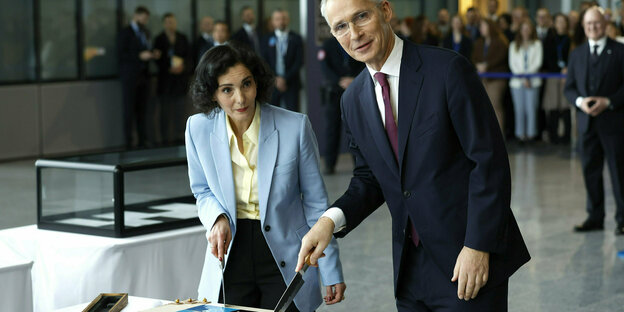There are no times of peace in sight due to Russia's war of aggression against Ukraine. The military alliance is being questioned like few times before.

Hopefully everyone got a piece of the chocolate cake. Photo: Geert Vanden Wijngaert/AP/dpa
If NATO's 32 states had their way, the military alliance's 75th birthday should be a celebration of peace of sorts. But in the third year of Russia's war of aggression against Ukraine, the alliance is under more pressure than ever. Ukrainian Foreign Minister Dmytro Kuleba dampened the good mood at the start of Thursday's celebrations in Brussels with clear demands.
More anti-aircraft systems would have to be delivered to Ukraine, specifically Patriots. In recent weeks, the Russian military has increased its attacks on energy suppliers, residential buildings, schools and gyms. Drones also struck Kharkiv in eastern Ukraine on Thursday night, leaving at least four people dead and several injured.
According to Kuleba, the Patriot anti-aircraft system is so important because it is the only system capable of intercepting ballistic missiles. Ukraine's Foreign Minister also addressed his request to the NATO-Ukraine Council, which met on Thursday in Brussels.
Shipments of weapons and ammunition to Ukraine are stalled because allies cannot keep their promises. There are individual initiatives, led for example by the Czech Republic, to consolidate supplies from allies and speed up deliveries. Currently, the time factor has an enormous influence on war events.
Without party issues: money, weapons, succession.
The great unknown is the United States. An aid package for Ukraine has been stalled in the US Congress for weeks and has been blocked by Republicans. There does not appear to be an agreement in sight. This impasse is one of the reasons why European states want to become more independent from the United States. “I don't believe only in the United States,” NATO chief Jens Stoltenberg stressed during the ceremony. “I believe in the United States and Europe together.”
While Stoltenberg and the foreign ministers of the NATO countries share a birthday chocolate cake with the words “NATO” and “NATO” – for the alliance's two official languages, French and English – the questions Urgent questions must be answered by The big anniversary party will be held no later than July in Washington. Above all, greater coordination of arms shipments to Ukraine and long-term support.
Before the meeting began, Stoltenberg had proposed a package worth 100 billion euros, money that would come from the allies' budgets. The proposal is not well received by all members.
Germany and Spain have so far reacted cautiously and are demanding a concrete plan for how the money will be used. With the Russian war of aggression, old US demands are resurfacing: European NATO allies should spend more money on their defense. Currently, only about 20 countries, including Germany, meet the required quota of two percent of gross domestic product.
And NATO has another major construction project to complete: Stoltenberg's successor. Dutch Prime Minister Mark Rutte is running for office and is supported by the United States, Britain and Germany. Recently, the Romanian president, Klaus Iohannis, also put his name into play. He is a very serious candidate for the highest position. Especially since Rutte does not have the support of Hungary and Türkiye. There is no official procedure to determine the successor; Negotiations take place behind closed doors. The US and the main EU states have weight.